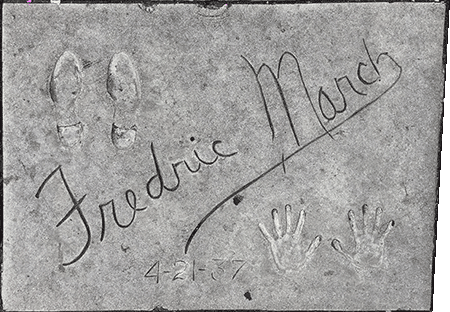 |
 |
|
|
| Fredric March |
 |
| Forecourt Ceremony held on Wednesday, April 21, 1937 |
| |
Born: Ernest Frederick McIntyre Bickel, August 31, 1897, in Racine, Wisconsin
Age at the time of the ceremony: 39
Died: April 14, 1975, in Los Angeles, California, age 77 |
| |
It has to be said: there is something about Fredric March. Widely considered a "great actor," March was also a great movie star, giving audiences and filmmakers that certain something they couldn't get from anyone else. Several of his portrayals are out-and-out classics.
Born to upper working-class parents, March attended the University of Wisconsin. Intending to enter the banking business, March served in the US Army as an artillery lieutenant during World War I. After his discharge, he was planning a return to banking, but an appendectomy which became critical caused the young man to commit to something else: heading to New York City in 1920 to act as an extra in the movies.
Ernest changed his name to Fredric March, and began hanging about the Broadway theatres. He made his debut in 1924's The Melody Man. March's talent must have been obvious, for he was given larger parts in Broadway plays between 1925-1927, after which, he was signed to an acting contract at Paramount Pictures. His first co-starring role was in The Dummy (released in March 1929) with Ruth Chatterton.
Although March bailed from his Paramount contract by 1934, preferring to remain a free agent, he entered into his "matinee idol" period, starring with many of the leading stars of the 1930s:
The Royal Family of Broadway (released in December 1930) with Ina Claire; he won the Best Actor Oscar for Dr. Jekyll and Mr. Hyde (released in January 1931) with Miriam Hopkins; starred in Cecil B. DeMille's The Sign of the Cross (released in February 1932) with Claudette Colbert; Design for Living (released in December 1933) with Gary Cooper and Miriam Hopkins; The Barretts of Wimpole Street (released in September 1934) with Norma Shearer; played Jean Valjean in Les Misérables (released in April 1935) opposite Charles Laughton as Javert; Count Vronsky opposite Greta Garbo in Anna Karenina (which played the Chinese in October 1935); and played the title character in Anthony Adverse (released in August 1936).
A key role for March during this time is that of Norman Maine in William Wellman's wonderful A Star Is Born (1937). The film had its Premiere at the Chinese, on Tuesday, April 20, 1937, so on the following day, March made his imprints in the Forecourt (although no photos of this event have surfaced).
His "matinee idol" phase continued with Nothing Sacred with Carole Lombard (which played the Chinese in December 1937), DeMille's The Buccaneer (released in February 1938), Susan and God with Joan Crawford (which played the Chinese in June 1940), So Ends Our Night with Margaret Sullivan (played the Chinese in March 1941), and I Married a Witch with Veronica Lake (released in October 1942).
March spent most of the rest of the 1940s on Broadway. In this phase of his career, March became well-known for creating the roles of Mr. Antrobus in The Skin of Our Teeth, which almost ran for a year in the 1942-43 season. March won the Tony Award twice; once creating the role of Clinton Jones in Years Ago in the 1946-1947 season, and a second time in the role of James Tyrone in the Broadway premiere of Long Day's Journey Into Night, which ran for 15 months in 1956-1958.
But it was in 1946 that brought March his most enduring role, that of returning soldier Al Stephenson in The Best Years of Our Lives (released in November that year), for which he won his second Oscar. His time on Broadway had allowed March space to outgrow his "matinee" period, and now, producers wanted him for his dramatic power (and marquee value).
March played a Judge in An Act of Murder with Florence Eldridge (released in December 1948), a corporate vice-president in Executive Suite (released in April 1954), a Rear-Admiral in The Bridges at Toko-Ri (released in December 1954), a TV network president in The Man in the Gray Flannel Suit (which played the Chinese in April 1956), a "faith-based" lawyer in Inherit the Wind (played the Chinese in November 1960), the US president in Seven Days in May (played the Chinese in March 1964, and in his final film, a saloon keeper in The Iceman Cometh (released in November 1973).
March died of prostate cancer in 1975, at the age of 77. |
|
|
|
|
| |
 |
 |
| Grauman's Chinese Theatre, Hollywood, California. Fredric March Forecourt block. Executed by Jean Klossner, Wednesday, April 21, 1937. 52 x 36 inches overall. |
 |
| |
 |
|
 |
|